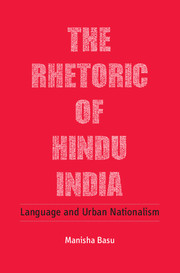Book contents
- Frontmatter
- Dedication
- Contents
- Preface
- 1 Introductory Matters: The Strange Case of Secular India
- 2 Time's Victims in a Second Republic: New Histories, New Temporalities
- 3 To Make Free and Let Die: The Economics of Metropolitan Hindutva
- 4 A Power over Life and Rebirth: V. D. Savarkar and the Essentials of Hindutva
- 5 Between Death and Redemption: Hindu India and its Antique Others
- 6 The After-Life of Indian Writing in English: Telematic Managers, Journalistic Mantras
- Bibliography
- Index
1 - Introductory Matters: The Strange Case of Secular India
Published online by Cambridge University Press: 23 July 2017
- Frontmatter
- Dedication
- Contents
- Preface
- 1 Introductory Matters: The Strange Case of Secular India
- 2 Time's Victims in a Second Republic: New Histories, New Temporalities
- 3 To Make Free and Let Die: The Economics of Metropolitan Hindutva
- 4 A Power over Life and Rebirth: V. D. Savarkar and the Essentials of Hindutva
- 5 Between Death and Redemption: Hindu India and its Antique Others
- 6 The After-Life of Indian Writing in English: Telematic Managers, Journalistic Mantras
- Bibliography
- Index
Summary
In 1992, Sara Suleri opened her now classic study The Rhetoric of English India with the memorable claim that ‘while the representation of otherness has long been acknowledged as one of the most culturally vexing idioms to read, contemporary interpretations of alterity are increasingly victims of their own apprehension of such vexation’. If one of the principal tasks of postcolonial criticism was to question the duality of center and margin, Suleri argues that the almost pietistic commemoration of the ‘Other’ in a spectacular celebration of alterity has done little to dissociate ‘otherness’ from its conceptual reliance on this polarization. Instead, concealing the dangerous collusions that are bred in any exchange between master and victim in the colonial setting, the valourization of otherness has actually consolidated the asymmetrical power relationship between metropolitan and peripheral societies. For Suleri then, rather than valourizing their differences, it is in fact more important to confront the complicities between rulers and ruled, so as to understand that telling the story of the Other involves being forced to encounter the narrative of the self and to ask, always, ‘just how other’ the Other really is (Suleri, 1992, 9). This conceptual terrain, as laid out by Suleri, is vitally important for the investigations in this book, which involve examining precisely such complicities in a context where it might fairly be said that the intellectual and political strength of the narrative of decolonization has collapsed and erstwhile anti-colonial societies have come to increasingly write themselves into empire, rather than oppose or counter it.
With Sara Suleri's searching analyses in the background, my book looks into a colonial and postcolonial rhetoric of binarism, considering in particular the polarized relationship between categories like tradition and modernity, self and other, religion and reason and east and west. I strive to articulate how, what Suleri had identified as the shadowy intimacies between such intractable others, have fared with the maturing of the phenomenon of globalization. That is to say, I ask simply: in what ways has the celebrated dissolution of erstwhile dualities like center and margin in a globalized dispensation affected foundational colonial and postcolonial ideas about difference?
- Type
- Chapter
- Information
- The Rhetoric of Hindu IndiaLanguage and Urban Nationalism, pp. 1 - 34Publisher: Cambridge University PressPrint publication year: 2016



